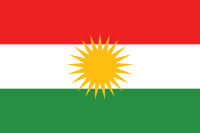This is what I asked myself earlier today when I passed a small group of men gathered at the GPO. Some were holding flags featuring a yellow sun on a backdrop of green, white and red stripes while others carried banners urging the Irish Government not to ignore Turkish war crimes in Kurdistan.
It was a tiny, peaceful demonstration that made its way down O’Connell Street and past Trinity College. A single man had a loud speaker and from it all that I could make out was the word “Kurdistan”.
The leaflet I took from one of the demonstrators is a double-sided photocopy and includes four photographs of dead bodies buried amongst rubble. One is of a 6-month old baby. The leaflet claims that “Turkish warplanes have been repeatedly bombing Kurdish villages since Wednesday 17th August” and that this is an example of “Turkish state terrorism against the Kurds which has been ignored by the international community and the European Union in particular”.
On the BBC website- updated just a few hours ago- a headline reads “Turkish airstrike campaign killed 160 Kurdish rebels”. According to the BBC, “The strikes follow a deadly attack by the separatists in mid-August that killed nine Turkish troops and injured 14 in the district of Cukurca, in Hakkari province close to the border.”
Kurdistan is wedged between Iraq, Turkey, Iran, Syria and Armenia and is neither a politically independent state nor a clearly-defined region (though its geoographical description encompasses small parts of all the countries which surround it). Its people speak a distinct language (Kurdish, not Arabic) and consider themselves to have a separate identity from that of any of their neighbour states. While Iraqi Kurdistan gained the right to self-governance in 1970, the Iranian province of Kurdistan is not autonomous.
In Turkey, the Kurdish Workers’ Party (PKK) has been waging war against Turkish rule for 26 years. To date, the conflict there has claimed over 40,000 lives.
Last May the Guardian reported that Sherko Moarefi, a member of a proscribed Kurdish group is at “imminent risk of execution” in Iran. A huge Amnesty International campaign is urgently calling for his release. I’ve been unable to find any up-to-date information about his condition or status online.
While I couldn’t find anything up-to-date on Aljazeera or the BBC, I did stumble upon this excellent Kurdish blog from last May, which describes how reporting of the death of Bin Laden overshadowed the case of Sherko Moarefi, whose execution happened to be postponed on the same day as the assassination.
I was inspired by this article by Dan Hind on Aljazeera English which calls for the media to prioritise explanation over emotion in its reporting, particularly in the case of humanitarian crises, where public contributions can make a huge difference, particularly when the sources of problems are adequately understood.
I’d like to thank the little group of men gathered at the Post Office for their double-sided photocopy and for the isses it has brought to my attention. Their voices resonated from a tinny megaphone and from two pages of broken, passionate English prose. I don’t know enough about the issue to make a judgement right now, but at least I’ve started to think.



That’s really interesting about the geographical designations, and it being split up between several countries. I didn’t realise the population was so localised (and indeed, that the locality was split between several nations), I always thought it was specifically a racial issue.
Plus, from the EU’s point of view, something like this would be a great way to delay Turkey’s entrance into the EU for even longer.
Thanks Kate, for playing your own part in spreading their message.
LikeLike